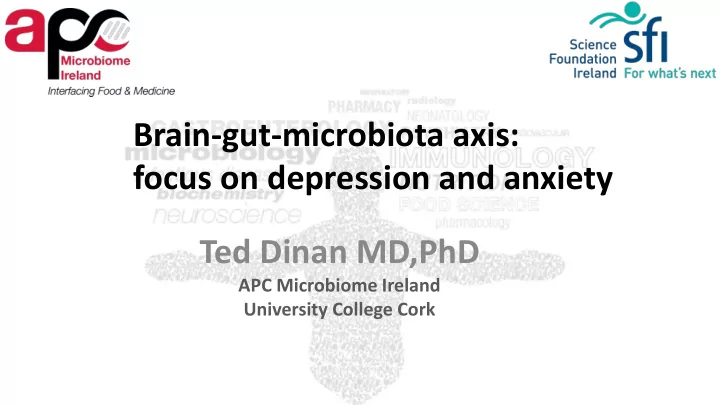

Brain-gut-microbiota axis: focus on depression and anxiety Ted Dinan MD,PhD APC Microbiome Ireland University College Cork
Acknowledgments http://apc.ucc.ie Our studies were funded by Science Foundation Ireland through a Centre grant and by the European Union through FP7 grants. We have also collaborated with the following companies: Mead Johnson, Cremo, Suntory, 4D Pharma, DuPont. I have lectured recently at meetings organised by J+J and Lundbeck.
http://apc.ucc.ie
Gut microbiota in major depression Kelly et al J Psychiat Res 2016
Transferring the Blues Healthy Depressed Microbiota Diversity Composition? F aecal M icrobiota T ransplantation Rat with depressive-related symptoms Healthy rat Kelly, et al. J Psychiat Res 2016 (anxiety, anhedonia, inflammation)
Targeting stress with live bacteria
Prebiotics http://apc.ucc.ie
Diet and mood http://apc.ucc.ie
Most anxiety studies conducted on healthy subjects http://apc.ucc.ie Cortisol Stress AUCg * 40 Perceived stress 30 20 10 0 Placebo Probiotic
Lost in translation http://apc.ucc.ie
http://apc.ucc.ie N=110 subjects with mild to moderate major depression Primary outcome measure was Beck Depression Inventory Probiotic treated subjects showed reduction in BDI relative to placebo Prebiotic treatment was similar to placebo
http://apc.ucc.ie Lactobacillus rhamnosus or placebo was given during pregnancy and postpartum for 6 months N=423 women Primary outcome measure was eczema
http://apc.ucc.ie SUBJECTS WHO RECEIVED PROBIOTIC HAD SIGNIFICANTLY LOWER DEPRESSION AND ANXIETY SCORES POSTPARTUMLOWERE Edinburgh Postnatal Depression Scale and State Trait Anxiety Inventory were used.
http://apc.ucc.ie B N=44 adults with IBS Double blind placebo controlled study Hospital Anxiety and Depression scale B longum reduced depression but not anxiety scores and changes were associated with altered fMRI patterns
http://apc.ucc.ie N=79 subjects with self report of depression, mild to moderate severity Randomised to L helveticus and Bif longum or placebo for 8 weeks No differences in outcome on psychological or inflammatory biomarkers
http://apc.ucc.ie N=40 patients with MDD L acidophilus + L casei + Bif bifidum or Placebo for 8 weeks BDI scores significantly decreased in probiotic treated group Decreases in CRP in probiotic group Glutathione levels rose in probiotic treated group
Meta-analysis of probiotics in depression http://apc.ucc.ie Probiotics are effective in reducing depressive symptoms in human studies. • Depression-reducing effect of probiotics was significant in those with major depression. • No significant anti-depressant effect of probiotics was noted in general population. • The antidepressant effect was not significant in those with non-depression diagnoses. • Multiple strains are more effective in reducing depression than single strain. Goh et al 2019, Psychiatry Res.
Probiotics and depression: Meta-analysis http://apc.ucc.ie Nikolova et al 2019 Ther Adv Psychopharmacol
Forest plot showing differences between probiotics and placebo http://apc.ucc.ie There is little evidence currently that probiotics have antidepressant action though they may work in combination with Nikolova et al, 2019 antidepressants
Prebiotic and Probiotic Meta-analysis http://apc.ucc.ie Liu et al 2019 Neurosci Biobehav Rev Prebiotics did not differ from placebo for depression or anxiety Probiotics yielded significant effects for depression and anxiety
What is required now? http://apc.ucc.ie Dose response studies with live biotherapeutics Studies examining the interaction of live biotherapeutics in polypsychobiotics Exploration of the impact of live biotherapeutics on the gut microbiota and depression biomarkers e.g. cortisol, cytokines Large placebo-controlled, parallel group studies in well phenotyped patient populations
Recommend
More recommend